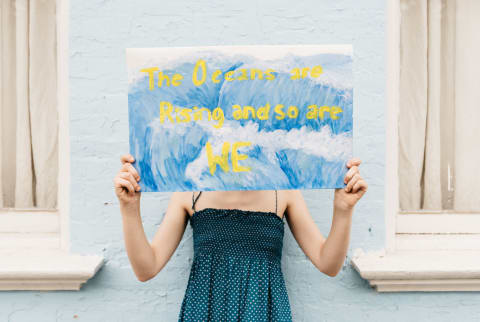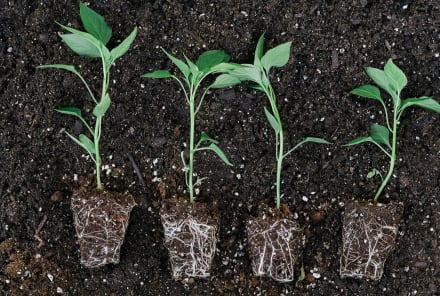Advertisement
6 Environmental Activists Respond To IPCC Climate Change Report


In the environmental movement, October 8, 2018, is a date that lives in infamy. That's when the United Nations Intergovernmental Panel on Climate Change (IPCC) released its (very bleak) special report outlining the challenges that lie ahead if global warming exceeds 1.5°C above pre-industrial levels.
Today, nearly three years later, the IPCC is back with another much-anticipated climate change report. This time around, 234 volunteer scientists sifted through over 14,000 studies and came to a loud-and-clear conclusion: We're heading down a dangerous path, and if we don't radically reduce our emissions, the results will be catastrophic.
The report (which you can read in full here) contextualizes the widespread wildfires, severe droughts, and extreme storms happening around the world as part of the larger climate puzzle and warns that, without immediate action, they likely will get worse.
In response, headlines are declaring a "code red for humanity" alongside images of climate refugees and burning homes. It's not a fun day to be on the internet.
Needless to say, news like this can bring a wave of difficult emotions. When we asked a number of environmental advocates how they're feeling today, responses ranged from disappointed to hopeless to terrified. This report is a punch in the gut. But once we catch our breath, we have a choice to make: Will we give up or speak out for the world we want to see?
Here, climate activists share how they are processing the latest IPCC report and how they hope it can inspire the quick and decisive action we need in the days, weeks, and years ahead:
"I keep in mind that climate change is actually about transformation."
"In the days leading up to the report, I've felt a foreboding sense of 'Will people actually engage with this? What is it going to take?' Then I keep in mind that climate change is actually about transformation: of who we are, what is important, and how we live with each other and our non-human neighbors. Then I remember that transformation is painful and threatening for many, and this opens my heart to the moment we are in as a species. My strategies involve staying as present as I can, taking care of myself mentally, physically, emotionally, and socially, and keeping in mind that I am part of a vast network of caring humans who are working very hard to bring about a more viable world... I advise people not to 'turn their anxiety into action' as much as making friends with our anxiety. Bring compassion to yourself and ourselves. And then, consider what can you best do to contribute. Anything at all, no matter how big or small, is valuable. And then, go have a conversation with someone in your life about this, and ask them: 'How are you feeling right now about our planet? What do you feel you are most called to do?'"
—Renee Lertzman, Ph.D., psychologist, author, and sustainability strategist
"What's been key for me is to realize that the only way out is through."
"I regularly experience All the Climate Feels! Grief, anger, overwhelm, empathy, anxiety, determination... I see five stages of radical climate acceptance, through which we can face reality as it is and find the courage to change what we can: Ignorance, Avoidance, Doom, All the Feels, and Purpose. What's been key for me is to realize that the only way out is through. Instead of trying to avoid uncomfortable feelings, I just need to sit with them and acknowledge them. They can carry important messages that help focus my energy and action. For example, grief points out what we love that is being harmed or lost, and anger points out where injustice needs to be righted. This work is tough, and I try to remember to take care of and prioritize things that keep me healthy and happy, like bike rides, playing in the garden, and time with friends."
—Kimberly Nicholas, Ph.D., climate scientist and author of the Under the Sky We Make book and We Can Fix It newsletter
"I try to remember all the social movements throughout history that have toppled oppressive regimes and shifted the trajectory of societies against all odds."
"I try to remember all the social movements throughout history that have toppled oppressive regimes and shifted the trajectory of societies against all odds. I think about the wealth of knowledge, experience, and skills that people around the world possess today when it comes to repairing the land and our societies. A lot of this expertise resides within poor, marginalized communities that haven't had the wealth, privilege, or resources to simply buy their way out of hunger or precarious living environments, and have instead relied on solutions developed through their own ingenuity and the accumulated knowledge of their ancestors... We need really big political changes and financial commitments at the national and global level, but big changes usually result from lots and lots of tiny, seemingly insignificant actions by regular people, coalescing into a force that politicians can't ignore. I think it's useful to acknowledge and accept that the future looks bleak but still focus your energy and attention on actions and possibilities that are within your control."
—Audrea Lim, journalist and editor of The World We Need: Stories and Lessons From America's Unsung Environmental Movement
"I am trying to focus on the fact that yes, the window to act is rapidly shrinking, but the window still exists."
"Mr. Rogers famously shared his mother's advice to 'look for the helpers' when news is scary. This advice is especially true of the climate crisis. There are so many organizations, companies, and individuals that are helping to create and implement solutions. It is always helpful to connect with like-minded individuals who are already doing inspiring work, and I draw a lot of strength from those types of conversations... With regard to the latest report, I am trying to focus on the fact that yes, the window to act is rapidly shrinking, but the window still exists. The concept of 'action' has never been more important, and whether it comes from world politicians, major corporations, or your next-door neighbor, everyone is being called to speak up and create change."
—Alysis Morrissey, climate activist and founder of Cre8ChangeNow
"We need to accept the facts and allow the fear and anxiety to work as propellers for change."
"I hope those on the fence about the reality of climate change take this report seriously and finally join a worldwide movement that is ready to work... We need to accept the facts and allow the fear and anxiety to work as propellers for change. A crisis has a way of clarifying things and moving us to act. So I say, reach out to organizations, talk to friends and neighbors, make this situation yours. We did this to our planet, and we need to own it in order to change it."
—Melissa Alvarado Sierra, writer and educator
"You have to keep going, keep trying, and enjoy the moments of hope you do occasionally find."
"For those of us who work toward environmental justice, the new IPCC report is not surprising. It is simply another affirmation of what we already know. The world is burning, and our class-based, material-driven societies are doing little—if anything—to combat the problem... In the days, weeks, and sometimes months that I have spent struggling with the reality of our situation, I ultimately realize that I cannot stop fighting, even if it seems hopeless. It is who I am and what I must be doing. You have to keep going, keep trying, and enjoy the moments of hope you do occasionally find."
—Nick Mullins, former Appalachian coal miner turned sustainability advocate











